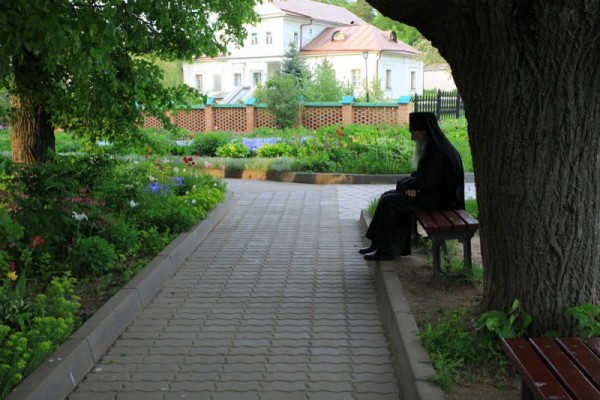Because of human weakness and propensity to misunderstanding, even a passing unkind word or a small thoughtless act can lead to serious consequences in personal relationships. Therefore much vigilance is required to sustain good will between people, and where trust is compromised, much care is needed to make things right.
Overcoming the Vice of AngerResentment
True happiness comes not from the abundance of possessions but from the quality of human relationships. Healthy relationships are marked by respect for others, humility, honesty, truthfulness, willingness to speak calmly and clear up misunderstandings, readiness to settle disputes fairly, and having the ability to reconcile and move on through good will and the gift of forgiveness. Wherever such traits are present in a marriage, a family, a community, or society in general, there also are to be found expressions of harmony, contentment, peace and true joy.
The enemies of healthy human relationships are ignorance, insensitivity, selfishness, evil desires, arrogance and blind pride. Such dispositions degrade human life and cause untold suffering and pain. They produce all sorts of misunderstandings, conflicts, animosities and bitterness between people. Because of human weakness and propensity to misunderstanding, even a passing unkind word or a small thoughtless act can lead to serious consequences in personal relationships. Therefore much vigilance is required to sustain good will between people, and where trust is compromised, much care is needed to make things right.

Overcoming the Vice of AngerResentment
True happiness comes not from the abundance of possessions but from the quality of human relationships. Healthy relationships are marked by respect for others, humility, honesty, truthfulness, willingness to speak calmly and clear up misunderstandings, readiness to settle disputes fairly, and having the ability to reconcile and move on through good will and the gift of forgiveness. Wherever such traits are present in a marriage, a family, a community, or society in general, there also are to be found expressions of harmony, contentment, peace and true joy.
The enemies of healthy human relationships are ignorance, insensitivity, selfishness, evil desires, arrogance and blind pride. Such dispositions degrade human life and cause untold suffering and pain. They produce all sorts of misunderstandings, conflicts, animosities and bitterness between people. Because of human weakness and propensity to misunderstanding, even a passing unkind word or a small thoughtless act can lead to serious consequences in personal relationships. Therefore much vigilance is required to sustain good will between people, and where trust is compromised, much care is needed to make things right.

In a discourse on “Rancor,” Dorotheos of Gaza (sixth century) provides helpful teaching on how to deal with issues of conflict and their consequences. St. Dorotheos’ first line of advice has to do with knowledge. Clear knowledge gives a person better leverage in dealing with conflict. The saint draws a distinction between stages in the process of conflict: provocation, disturbance of mind, anger, rage and animosity or rancor. He illustrates his teaching with the help of the following example.
When someone lights a fire, he must start with a spark, let us say, by striking a match. The spark is a brother’s or sister’s provocative word or act. If you can deal with it sensibly, the spark goes out. But if you pick up on it and allow it to grab your attention, you give it life. It is like adding “a small bit of wood to the flame, or some bit of fuel, and you produce some smoke, that is disturbance of mind.” The more you think about it, the more your feelings turn into anger and anger turns into inward rage. It is like piling logs on the fire which blazes potentially beyond control. You torment yourself and are ready to fly at the offending person, and also others at any time, because of the inner turmoil. Unless resolved, time turns these feelings of anger into lingering animosity or rancor. The Greek word is mnesikakia, literally remembrance of evils or wrongs done. This state is defined by deep seated ill will, spiteful animosity and bitterness toward another human being.
But how is a person to deal with provocations sensibly? St. Dorotheos counsels to keep his teaching in view and to know the difference between annoyance, temper, losing one’s temper, and lapsing into rancor. With this knowledge be prepared ahead of time. Make it a matter of spiritual strategy to cut off the process of conflict at the start. Stand back, take a deep breath, think before you speak or act, and have alternative ways of responding to situations when sparks are ready to fly. Do not allow annoyance to turn into anger and anger into rancor. “When a passion arises, when it is young and feeble, cut it off, lest it stiffen and cause you a great deal of trouble. It is one thing to pluck out a small weed and quite another thing to uproot a great tree.”
Each of us can think of positive ways of responding to provocations. Sometimes it is best to keep silence and take up the matter at a more opportune time. Or a person can speak softly and ask questions of clarification: “What makes you feel that way? Can you please explain what you mean?” Or a person can humbly excuse themselves, saying “I am very sorry you feel that way. I did not mean to offend you. Let’s calm down and talk about it.” We can let the moment pass and at another time address an offender with patient words: “John or Mary, what you said the other day really hurt me. Can we take some time and talk about it. I value our relationship. Let’s try to clear up the misunderstanding.” There are ways to find the right words and speak with the right tone voice to keep the fire from flaring up with the risk of consuming those involved.
St. Dorotheos pays special attention to the human tendency and desire to get even and render evil for evil. He recalls Psalm 7:5 where we pray to God, “If I have paid back evil for evil, let me fall down defenseless before my enemies.” To commit evil for evil is to work against our own self. The saint explains: “The ‘falling’ means no longer to have the power to get up. The ‘defenseless’ means not to have anything good left in us by which we may at length get up again.” We are in danger of losing “our capacity for acting virtuously, or power of right action” by wanting to get even.
There are different ways of rendering evil for evil, not only by words and actions but also by attitudes, movements and looks, all of which must be discerned and avoided. A cold shoulder speaks volumes of resentment in the heart. A disdainful glance can serve as an arrow tipped with malice. Furthermore, although a person may not harbor a complaint or resentment against a brother, but then that same person is amused and is glad when someone else reviles that brother. Another person may not be annoyed by a brother, but then the same person is not gracious enough to be glad when something good happens to that brother or when that brother is praised by others. All these ways are, according to St. Dorotheos, subtle forms of rendering evil for evils and expressions of hidden rancor. They must be carefully discerned, combated and confessed to God. Christ’s charge was to love our enemies and pray for them. St. Paul taught: “Do not be overcome by evil, but overcome evil with good” (Romans 12:21).
However, knowledge alone and defense strategies are not enough in themselves to deal effectively with provocations and wrongs committed. The intervening grace of God is absolutely crucial in limiting conflict and bringing about reconciliation and healing. At the first spark of conflict, prayer is the most positive and effective response as both background and inspiration to all other useful approaches. Prayer is an inner secure place of peace and reflection, where a human being can find the resources to deal most thoroughly with conflicts and personal hurts.

In the Orthodox tradition the “Jesus Payer” (“Lord Jesus Christ, have mercy on me”) is given as a “battle ax” against all trials and temptations. It can be adapted to a short invocation as circumstance require, such as “Lord, have mercy!” or “Lord, give me strength, or give me patience, or give me light to deal with this problem.” When sparks light up, invoking the Jesus Prayer helps the soul to take refuge in its own spiritual home, defusing anger, and holding back words or actions that would prove regrettable.
St. Dorotheos suggests a silent and humble prayer of the heart which lifts up the dignity of the offender himself. “O God, help my brother and me, through his prayers!” With these words a person intercedes for his brother or sister, a sure sign of sympathy and love, and he is humbling himself by asking help from God through the offender’s prayers. St. Dorotheos asks: “Where there is sympathy and love and humility, how can wrath and other passions develop?” He quotes a saying from Evagrius the Ascetic: “The man who prays for his enemies is a man without rancor.” Praying for the wellness and salvation of our adversaries provides the surest path to being healed from resentments and to preparing the ground for healing and peace. St. Dorotheos ends his treatise with this prayerful counsel: “May God give us to remember and keep what we have heard [learned], lest it bring us a heavy sentence on the day of judgment.” Pray for us. O saint of God!
When someone lights a fire, he must start with a spark, let us say, by striking a match. The spark is a brother’s or sister’s provocative word or act. If you can deal with it sensibly, the spark goes out. But if you pick up on it and allow it to grab your attention, you give it life. It is like adding “a small bit of wood to the flame, or some bit of fuel, and you produce some smoke, that is disturbance of mind.” The more you think about it, the more your feelings turn into anger and anger turns into inward rage. It is like piling logs on the fire which blazes potentially beyond control. You torment yourself and are ready to fly at the offending person, and also others at any time, because of the inner turmoil. Unless resolved, time turns these feelings of anger into lingering animosity or rancor. The Greek word is mnesikakia, literally remembrance of evils or wrongs done. This state is defined by deep seated ill will, spiteful animosity and bitterness toward another human being.
But how is a person to deal with provocations sensibly? St. Dorotheos counsels to keep his teaching in view and to know the difference between annoyance, temper, losing one’s temper, and lapsing into rancor. With this knowledge be prepared ahead of time. Make it a matter of spiritual strategy to cut off the process of conflict at the start. Stand back, take a deep breath, think before you speak or act, and have alternative ways of responding to situations when sparks are ready to fly. Do not allow annoyance to turn into anger and anger into rancor. “When a passion arises, when it is young and feeble, cut it off, lest it stiffen and cause you a great deal of trouble. It is one thing to pluck out a small weed and quite another thing to uproot a great tree.”
Each of us can think of positive ways of responding to provocations. Sometimes it is best to keep silence and take up the matter at a more opportune time. Or a person can speak softly and ask questions of clarification: “What makes you feel that way? Can you please explain what you mean?” Or a person can humbly excuse themselves, saying “I am very sorry you feel that way. I did not mean to offend you. Let’s calm down and talk about it.” We can let the moment pass and at another time address an offender with patient words: “John or Mary, what you said the other day really hurt me. Can we take some time and talk about it. I value our relationship. Let’s try to clear up the misunderstanding.” There are ways to find the right words and speak with the right tone voice to keep the fire from flaring up with the risk of consuming those involved.
St. Dorotheos pays special attention to the human tendency and desire to get even and render evil for evil. He recalls Psalm 7:5 where we pray to God, “If I have paid back evil for evil, let me fall down defenseless before my enemies.” To commit evil for evil is to work against our own self. The saint explains: “The ‘falling’ means no longer to have the power to get up. The ‘defenseless’ means not to have anything good left in us by which we may at length get up again.” We are in danger of losing “our capacity for acting virtuously, or power of right action” by wanting to get even.
There are different ways of rendering evil for evil, not only by words and actions but also by attitudes, movements and looks, all of which must be discerned and avoided. A cold shoulder speaks volumes of resentment in the heart. A disdainful glance can serve as an arrow tipped with malice. Furthermore, although a person may not harbor a complaint or resentment against a brother, but then that same person is amused and is glad when someone else reviles that brother. Another person may not be annoyed by a brother, but then the same person is not gracious enough to be glad when something good happens to that brother or when that brother is praised by others. All these ways are, according to St. Dorotheos, subtle forms of rendering evil for evils and expressions of hidden rancor. They must be carefully discerned, combated and confessed to God. Christ’s charge was to love our enemies and pray for them. St. Paul taught: “Do not be overcome by evil, but overcome evil with good” (Romans 12:21).
However, knowledge alone and defense strategies are not enough in themselves to deal effectively with provocations and wrongs committed. The intervening grace of God is absolutely crucial in limiting conflict and bringing about reconciliation and healing. At the first spark of conflict, prayer is the most positive and effective response as both background and inspiration to all other useful approaches. Prayer is an inner secure place of peace and reflection, where a human being can find the resources to deal most thoroughly with conflicts and personal hurts.

In the Orthodox tradition the “Jesus Payer” (“Lord Jesus Christ, have mercy on me”) is given as a “battle ax” against all trials and temptations. It can be adapted to a short invocation as circumstance require, such as “Lord, have mercy!” or “Lord, give me strength, or give me patience, or give me light to deal with this problem.” When sparks light up, invoking the Jesus Prayer helps the soul to take refuge in its own spiritual home, defusing anger, and holding back words or actions that would prove regrettable.
St. Dorotheos suggests a silent and humble prayer of the heart which lifts up the dignity of the offender himself. “O God, help my brother and me, through his prayers!” With these words a person intercedes for his brother or sister, a sure sign of sympathy and love, and he is humbling himself by asking help from God through the offender’s prayers. St. Dorotheos asks: “Where there is sympathy and love and humility, how can wrath and other passions develop?” He quotes a saying from Evagrius the Ascetic: “The man who prays for his enemies is a man without rancor.” Praying for the wellness and salvation of our adversaries provides the surest path to being healed from resentments and to preparing the ground for healing and peace. St. Dorotheos ends his treatise with this prayerful counsel: “May God give us to remember and keep what we have heard [learned], lest it bring us a heavy sentence on the day of judgment.” Pray for us. O saint of God!
http://www.pravmir.com/widsom-saints-dealing-anger-animosity-bitterness/
